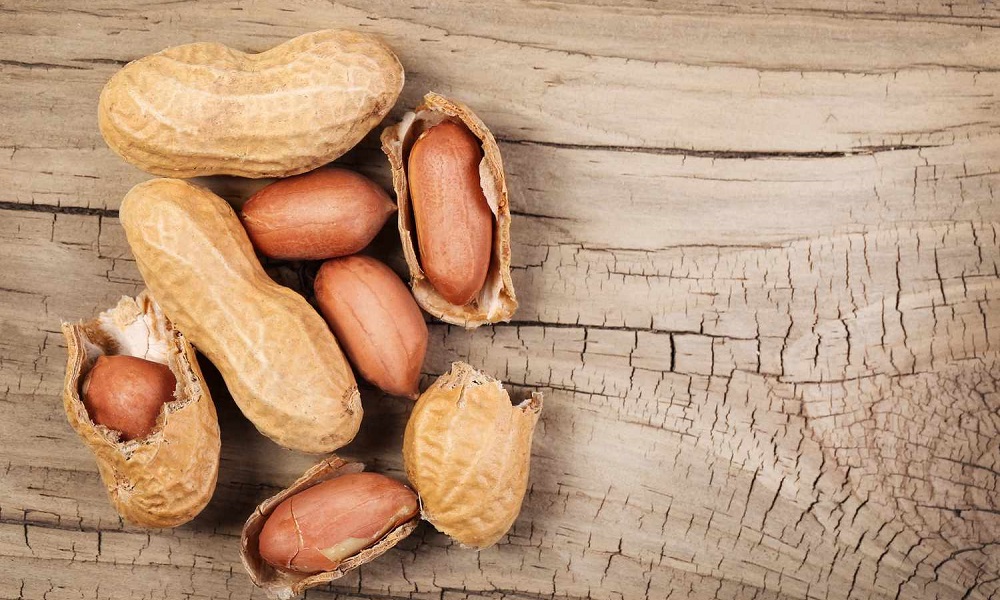The answer is yes. Peanuts are a good source of protein and essential nutrients for dogs, but they also contain a high amount of fat.
This can lead to weight gain and other health problems in dogs if they eat too many peanuts. So, while peanuts are not necessarily bad for dogs, they should be given in moderation.

What Happens If a Dog Eats Peanuts?
If a dog eats peanuts, it may not always cause an immediate emergency, but it’s not an ideal situation either. Peanuts themselves are not toxic to dogs, but they can present some potential risks:
Digestive issues: Peanuts are high in fat, and consuming large amounts can lead to digestive upset, including vomiting, diarrhea, or gastrointestinal discomfort.
Choking hazard: Whole peanuts or large pieces can pose a choking hazard for dogs, especially for smaller breeds.
Allergic reactions: Some dogs can be allergic to peanuts, and if they are, eating peanuts may cause symptoms such as itching, swelling, hives, or even more severe reactions like difficulty breathing.
Pancreatitis: The high-fat content in peanuts can potentially trigger pancreatitis in some dogs, especially those with a history of the condition.
Salted or flavored peanuts: Salted peanuts or those with added flavorings, such as garlic or onion, can be harmful to dogs. High salt intake can lead to sodium ion poisoning, and substances like garlic and onions are toxic to dogs.
How Many Peanuts Can a Dog Eat?
It is important to monitor how many peanuts your dog eats. Peanuts are a high-fat food and can cause gastrointestinal upset in some dogs.
It is best to give your dog a small handful of peanuts rather than an entire bag. If you are unsure about whether or not your dog can eat peanuts, check with your veterinarian first.
What Nuts Should Dogs Never Eat?
There are a few nuts that dogs should never eat, as they can be toxic to them. These include:
Macadamia nuts: Contain a toxin that can cause paralysis and even death in dogs. These contain a toxin that can cause paralysis and even death in dogs.
Walnuts: These contain a chemical called juglone which is toxic to dogs and can cause vomiting, diarrhea, and seizures. These contain a chemical called juglone which is toxic to dogs and can cause vomiting, diarrhea, and seizures.
Almonds: While not technically a nut, almonds still contain cyanide which is poisonous to dogs. Symptoms of almond toxicity include difficulty breathing, panting, and weakness.
So, if you’re ever tempted to share your nutty snacks with your furry friend, make sure you avoid any of the above!
Are Any Nuts Toxic to Dogs?
There are a few nuts that are toxic to dogs and should be avoided. These include macadamia nuts, walnuts, and pecans.
Ingestion of these nuts can result in vomiting, diarrhea, weakness, tremors, and seizures. If your dog has consumed any of these nuts, it is important to seek veterinary care immediately.
Are Salted Peanuts Bad for Dogs?
Peanuts are generally safe for dogs to eat, but salt can be harmful. Too much salt can lead to dehydration, electrolyte imbalances, and even kidney disease in dogs.
So, it’s best to limit your dog’s intake of salted peanuts or any other salty snacks. If you do give your dog some peanuts, make sure to offer plenty of fresh water as well.
What to Do If My Dog Eats Peanuts?
Peanuts are a common allergen for dogs and can cause serious health problems. Symptoms of an allergic reaction include vomiting, diarrhea, difficulty breathing, and swelling of the face or paws.
If your dog is experiencing any of these symptoms, they need to be seen by a vet immediately. There is no one definitive answer for what to do if your dog eats peanuts. The severity of the reaction will dictate the course of treatment.
For mild cases, your vet may recommend giving your dog Benadryl and monitoring them closely. More severe reactions may require hospitalization and IV fluids. Dogs may need to be given epinephrine or steroids to control their symptoms.
The best way to prevent your dog from reacting to peanuts is to avoid feeding them altogether. Be sure to read the labels on all foods and treats before giving them to your pup, as many products contain peanut ingredients.
Are Peanut Shells Bad for Dogs?
The short answer is no, peanut shells are not bad for dogs. They can be quite beneficial! Peanut shells contain high levels of fiber which can help keep your dog’s digestive system regular.
They also provide essential vitamins and minerals that are necessary for your dog’s overall health. That being said, there are a few things to keep in mind when feeding your dog peanut shells.
First, make sure that the shells are completely free of any nuts or other food items that could potentially cause an allergic reaction in your dog.
Second, avoid giving your dog too many peanut shells at once as this could lead to gastrointestinal issues such as diarrhea or vomiting.
Overall, peanut shells are safe for dogs and can even offer some health benefits! Just be sure to feed them in moderation and always remove any potential allergens before giving them to your pup.
Conclusion
Peanuts are good for dogs! Peanut butter, that is. Dogs love the stuff, and it’s a great source of protein and healthy fats.
Just be sure to choose a peanut butter with no added sugar or salt, and avoid giving your dog any nuts that are still in their shells.